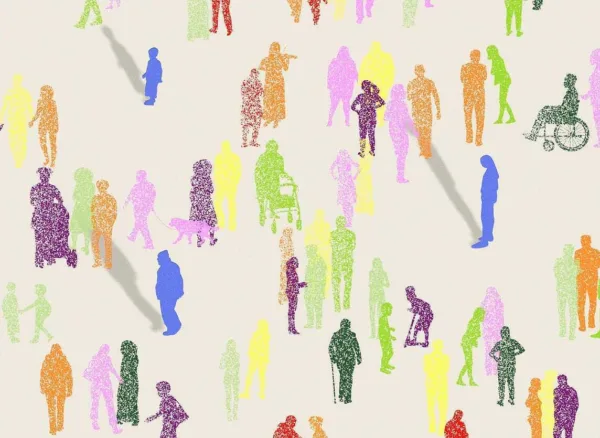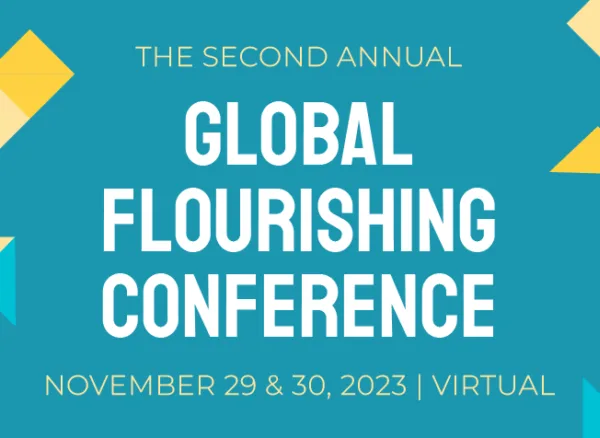Menu

What does it mean for all to flourish?
What constitutes human flourishing differs across individuals, cultures, and religious and theological traditions. The Oxford English Dictionary defines flourishing as "growing in a healthy or vigorous way.” The etymology of the term comes from the Latin florere, to bloom, blossom, or flower. The World Health Organization's definition from 1948, still in place today, is that health is "a state of complete physical, mental, and social wellbeing, not merely the absence of disease or infirmity." At Harvard's Human Flourishing Program, the working definition of flourishing is "living in a state in which all aspects of a person's life are good."
Directed by Professor Tyler VanderWeele, The Human Flourishing Program at Harvard University's Institute for Quantitative Social Science has developed a measurement approach to human flourishing.
Beyond the general definitions above, VanderWeele sees positive psychology as a viable tool with which to assess flourishing. He notes, however, two important keys missing from that discipline. The first oversight has to do with health — it's important to explore if "we're flourishing when we're bedridden or seriously ill." The second is the omission of character or virtue. This is "contrary to [what] Plato, Aristotle, or most Western philosophical traditions, and religious traditions worldwide" often associate with flourishing.
Harvard's Human Flourishing Program has designed an approach based around five central domains characterizing flourishing across cultures and contexts: happiness and life satisfaction; mental and physical health; meaning and purpose; character and virtue; and close social relationships. Each of these is nearly universally desired, and each constitutes an end in and of itself. "I would not argue that these exhaust flourishing, but each is a part of it," clarifies VanderWeele. "They help shape consensus around what to measure."
To delve deeper, the study has created a Flourishing Index based upon questions within each of these five domains. These are drawn primarily from the existing work on wellbeing that has received some degree of empirical validation. The Index also features two questions newly proposed by Harvard's study. Those are "in the character domain, where we worked with philosophers to develop more global assessments based on the tradition of the cardinal virtues, i.e. practical wisdom, justice, fortitude, and moderation," says VanderWeele. To learn about the questions, watch VanderWeele's presentation in the above video and download them here for use under The Human Flourishing Program's creative commons license.
In the video, VanderWeele shares data collected from the United States in a roughly nationally representative sample, both prior to the WHO's declaration of the COVID-19 pandemic and in the midst of it. He also discusses the recent partnership between the Human Flourishing Program at Harvard and Baylor University's Institute for the Studies of Religion. This research initiative features data collection carried out by Gallup and is funded by the Templeton philanthropies. Learn more about the study, which will consist of 240,000 individuals in 22 geographically, culturally, and religiously diverse countries representing roughly half of the world's population. It will be an Open Access Data resource hosted by the Center for Open Science, so the data will be publicly available.
Broadcasting journalist, Redi Tlhabi turns to a panel of global thought leaders to react to VanderWeele's presentation. The speakers share how their respective experiences find common ground with the studies VanderWeele describes, and where the field of flourishing research might expand to consider a wider scope. Here are a few highlights:
Play the above video to hear the Introduction to Global Human Flourishing at The First Global Scientific Conference on Human Flourishing, organized by Templeton World Charity Foundation.
Featuring:
Tyler VanderWeele, Professor, Harvard University
Yuria Celidwen, Postdoctoral Fellow, University of California, Berkeley
Diane Gashumba, Ambassador of Rwanda to the Nordics
Thupten Jinpa Langri, President, Compassion Institute; Principal English translator to the Dalai Lama since 1985
Hosted by:
Redi Tlhabi, Broadcasting Journalist
Visit HumanFlourishing.org to learn more.




